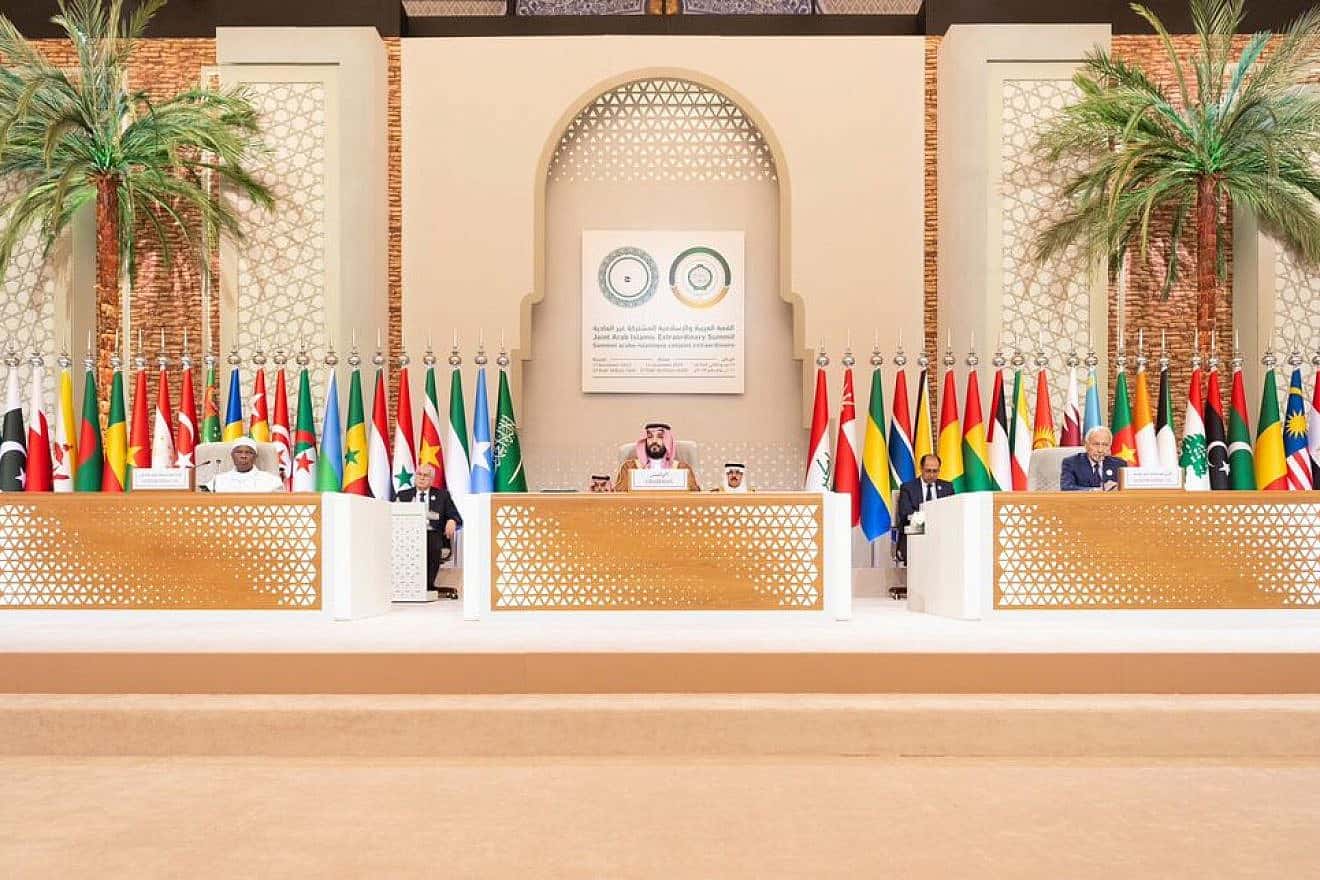by Troy O. Fitzhand
Saudi Crown Prince Mohammed bin Salman has said at least three times since the Gaza war started that peace is still likely on the horizon.
 |
| Saudi Crown Prince Mohammed bin Salman (center) presides over the Joint Arab-Islamic Extraordinary Summit in Riyadh, Nov. 11, 2023. Credit: The Organization of Islamic Cooperation. |
Judging only by public statements by Arab leaders, including signatories to the 2020 Abraham Accords peace treaties with Israel, you would think that the Jewish state’s ties with the Arab world are at a decades’ low, and any peace made, or in the works, is all but over.
However, as the war in Gaza rages on, it appears that not only are the peace pacts already forged holding strong, but prospects for more after the war are becoming increasingly stronger.
This past Saturday, leaders from 56 countries and the PLO convened in the Saudi capital of Riyadh for the Organization of Islamic Cooperation summit. The readout, unsurprisingly, condemned the IDF’s actions against Hamas. The most surprising news though is what came afterward.
A more severe statement was considered, likely drafted by Iran, that would have worked to prevent the transfer of weapons stored in Arab countries to Israel, freeze diplomatic and economic ties, impose an oil embargo, and close air space to Israeli aircraft.
This was blocked by a coalition led by Saudi Arabia, which included Egypt, Jordan, the United Arab Emirates, Bahrain, Morocco, Mauritania and Djibouti. All of these nations, with the exception of Saudi Arabia and Djibouti, have peace agreements or formal diplomatic ties with Israel.
The Iranians and a two-state solution
Hussain Abdul-Hussain, a research fellow at the Washington-based Foundation for Defense of Democracies, clarified the voting mechanism of such events, saying the details are ironed out prior to the summits by the foreign ministries. He said he was not surprised that the stricter condemnation was not agreed to, not least because of the ties the countries already have.
The highlight is that “the Saudis managed to get the Iranians to sign on a statement that endorses a two-state solution,” Abdul-Hussain says.
According to the statement, “a credible peace process should be launched on the basis of international law, legitimate international resolutions and the principle of land for peace … within a specific time frame and based on the implementation of the two-state solution with international guarantees.”
Abdul-Hussain says that though it doesn’t mean Iran supports this—Tehran has been clear of its goal to destroy Israel—the Saudis will use it. “This will protect the Saudis in the future with peace negotiations. …it is a success from the Saudi point of view.”
It is widely accepted that Iran implicitly gave the green light to Hamas to conduct its brutal terror attack on Oct. 7 to start the current war, in an effort to upend peace talks between Israel and Saudi Arabia. Before the war, it was anticipated that peace could come in just a few months. At the same time, prior to the war, Iran and Saudi Arabia had warmed their own ties.
Abdul-Hussain dismisses this, saying, “Ties with Iran don’t harm potential peace with Israel.”
Dr. Yonatan Freeman, an expert on international relations at the Hebrew University of Jerusalem, also says this doesn’t matter. He also says it doesn’t mean they are even friendly, pointing to the fact that many countries maintain embassies in hostile territory, giving the U.S. presence in Russia as an example.
More so, Abdul-Hussain brought up that Saudi Crown Prince Mohammed bin Salman has said at least three times since the war started that peace was still likely on the horizon.
Both experts, therefore, are confident in the prospects of formal peace between Israel and Saudi Arabia once the war ends, assuming the high-intensity warfare remains confined to the Gaza front.
Lebanon brings in a different part of the equation. Israel has been exchanging fire with Hezbollah terror forces in the north in what has so far not led to a serious escalation, but the localized conflict could spill into all-out war.
Freeman says if this happens it could hurt the chances for peace, because the perspectives of the Arab world may change.
Abdul-Hussain does not believe war in the north will break out, saying it does not make any sense for Hezbollah. It could violate what is known in Israel as the Dahieh doctrine, in reference to the Israel Air Force’s destruction of the Dahieh quarter (where Hezbollah has its headquarters) in Beirut in the 2006 Second Lebanon War, meaning that it just isn’t worth the destruction in the Land of the Cedars that Hezbollah would face if there is another war.
As to why Hezbollah leader Hassan Nasrallah keeps up the rhetoric despite not actually wanting war, Hussain-Abdul says there is a Lebanese proverb that reads “Whoever picks up the biggest stone never throws it.” So, while Hezbollah may talk, it is not really ready for war.
Assuming this holds true, the prospects for peace remain high.
Troy O. Fitzhand
Source: https://www.jns.org/is-israel-arab-peace-fading-or-holding-strong-in-the-face-of-war/
No comments:
Post a Comment